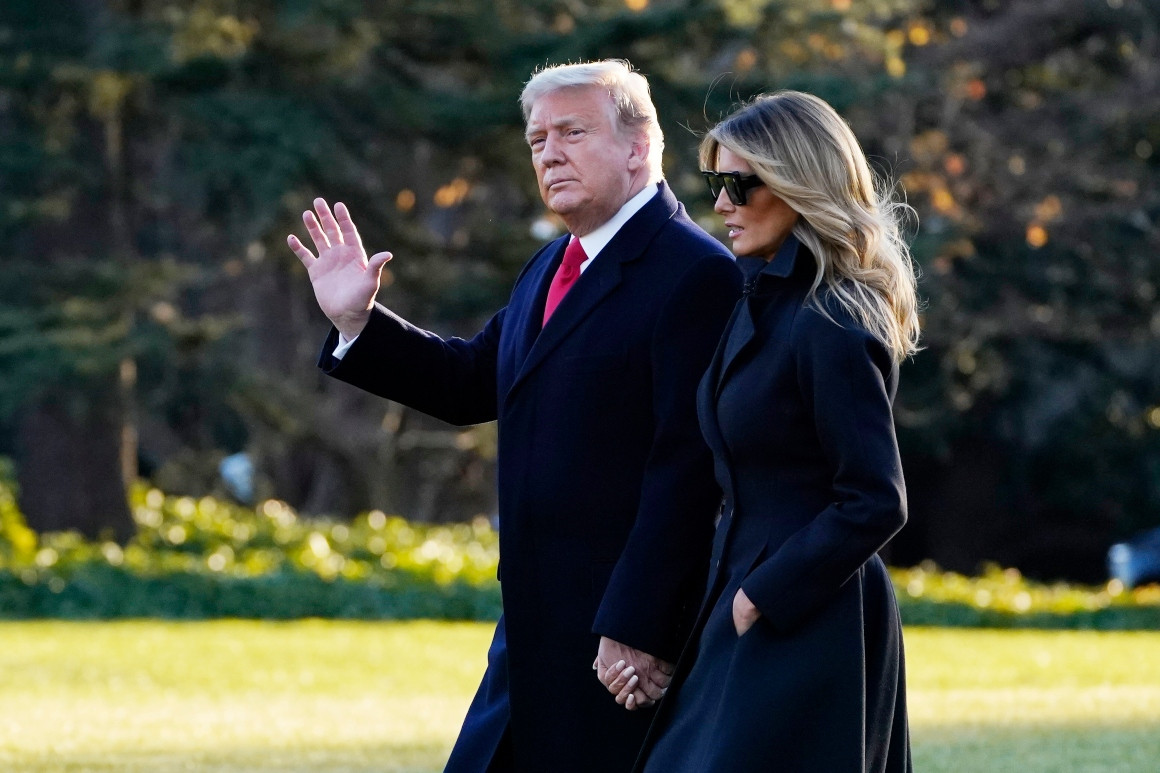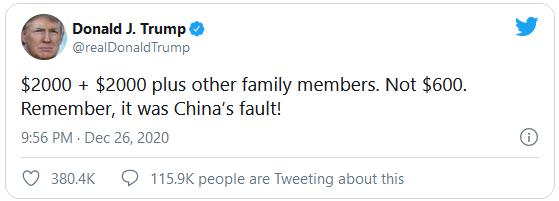
A government shutdown was averted after the president approved the Covid relief package and annual spending bill.
By Burgess Everett, Sarah Ferris, Marianne Levine and Melanie Zanona
President Donald Trump signed into law a major coronavirus stimulus package along with an annual spending bill, avoiding a government shutdown before a Monday night deadline.
Trump has railed against the $900 billion coronavirus relief bill and a $1.4 trillion government funding bill since Congress approved it, demanding $2,000 checks and cutting out foreign aid. But on Sunday evening after days of being lobbied by allies, Trump decided to sign the bill and not leave office amid a maelstrom of expired benefits and a government shutdown.
He said he will insist on reductions in spending in parts of the bill, though Congress does not have to go along.
“I will sign the omnibus and Covid package with a strong message that makes clear to Congress that wasteful items need to be removed. I will send back to Congress a redlined version, item by item, accompanied by the formal rescission request to Congress insisting that those funds be removed from the bill,” Trump said on Sunday night.
The president also said the Senate would soon begin work on ending legal protections for tech companies, examining voter fraud and boosting the check size for direct payments. The current Congress ends in six days.
“I applaud President Trump’s decision to get hundreds of billions of dollars of crucial COVID-19 relief out the door and into the hands of American families as quickly as possible,” said Senate Majority Leader Mitch McConnell in a statement that did not mention the commitments Trump said the Senate has made.
House Minority Leader Kevin McCarthy and several Republican senators, including Sens. David Perdue (R-Ga.) and Lindsey Graham (R-S.C.), labored to convince Trump to sign off on the bill over the weekend, according to multiple sources.
Without action, the government was set to shut down on Monday night and an eviction moratorium would lapse shortly thereafter. Though Trump’s decision headed that off, his initial refusal to sign the bill may still have consequences after unemployment benefits lapsed over the weekend.
After careful negotiations among congressional leaders and Treasury Secretary Steven Mnuchin, Trump threatened to blow up the deal — which his own administration negotiated and indicated he would support. More than $2 trillion was at stake, including badly needed pandemic aid for programs like unemployment and food assistance.
Republicans both privately and publicly tried to sway Trump to change his mind after days of attacks on the bill.
“I understand he wants to be remembered for advocating for big checks, but the danger is he’ll be remembered for chaos and misery and erratic behavior if he allows this to expire,” Sen. Pat Toomey (R-Pa.) said on “Fox News Sunday” of Trump’s demand for larger stimulus checks.
“You don’t get everything you want, even if you’re the president of the United States,” he said. Toomey also suggested that most Republicans won’t support the $2,000 checks the president wants because it’s “terribly untargeted.”
The House is returning Monday after Trump made good on his threat to veto a $741 billion defense policy bill on Dec. 23 over his objections to renaming military bases honoring Confederate leaders as well as online liability protections, requiring lawmakers to take action before the end of the 116th Congress. The Senate is expected to return Tuesday.
Both the defense bill and the spending package passed Congress by veto-proof majorities. Congress sent the massive spending package to Trump Thursday.
The $600 stimulus checks that were once expected to reach Americans by this week now could be delayed. Meanwhile, unemployment programs established earlier this year expired over the weekend.
Trump spent the weekend railing against the current package, tweeting that he wants to “increase payments to the people, get rid of the ‘pork’” and “$2000 + $2000 plus other family members. Not $600. Remember, it was China’s fault!”
Lawmakers were preparing for catastrophe amid Trump’s threats, and House members were prepared on Monday to vote on a short-term funding bill to avert a midnight shutdown. The House will move ahead with a vote Monday on boosting direct payments to $2,000, forcing Republicans to go on the record against the president.
“Now, the president must immediately call on congressional Republicans to end their obstruction and to join him and Democrats in support of our stand-alone legislation to increase direct payment checks to $2,000, which will be brought to the floor tomorrow,” Speaker Nancy Pelosi said in a statement Sunday night.
Senate Minority Leader Chuck Schumer said Sunday night he will attempt to pass $2,000 checks in the Senate but he is all but guaranteed to face objections from some Republicans. The Senate is scheduled to return Tuesday to begin the process of overriding Trump’s veto of the annual defense bill.
It’s the latest whiplash for the 116th Congress, which began with an epic 35-day government shutdown and will end with twin public health and economic crises.
Party leaders were forced to make plans quickly after Trump called the coronavirus package a “disgrace” and demanded $1,400 more per stimulus check. But several noted that Trump has also expressed frustration with legislation that he then proceeded to sign, including a $1.3 trillion spending bill in 2018.
In a video message last week, Trump criticized the stimulus bill for “wasteful spending,” even though he previously approved the spending levels. In an effort to appease the president, McCarthy suggested revisiting funding levels for state and foreign operations, but Senate Republicans don’t appear to have much appetite for renegotiation.
“Frankly if you start opening part of the bill up, it’s hard to defend not opening the whole bill up,” said Sen. Roy Blunt (R-Mo), the No. 4 GOP leader. “It took us a long time to get to where we are, I think, reopening that bill would be a mistake.”
Trump’s eleventh-hour demands came after he largely stayed out of negotiations, leaving much of the deal making to Mnuchin. The president is instead focusing on a futile effort to overturn the results of Nov. 3 election and is lashing out at Republicans, including McConnell and Senate Majority Whip John Thune (R-S.D.) for recognizing Joe Biden as president-elect.
Read the original story on Politico.com.












